James Gunn may be part of the obscenely powerful Disney machine, but deep down, he’ll always be a Troma guy. Gunn has broken into the mainstream with his Guardians of the Galaxy films, and now The Suicide Squad, but the filmmaker got his start at Z-grade studio Troma, where he helmed the trashy Tromeo and Juliet. While his Marvel entries can’t be classified as subversive, he has plenty of other off-kilter work to his name – he directed the ultra-violent superhero send-up Super and the gooey monster flick Slither; he also has a producer credit on the gnarly Brightburn and a screenwriting credit on the bloody The Belko Experiment. And now, for the first time, Gunn has been given a massive budget to bring his sleazoid sensibilities to the world of DC with The Suicide Squad, a sequel – sort of – to David Ayer’s toxic waste dump of a movie Suicide Squad.
Major spoilers for The Suicide Squad follow. You’ve been warned!
Better Than The First Movie (Obviously)
David Ayer’s Suicide Squad was a big box office hit, but it’s also universally loathed. But a hit is a hit, and a sequel was inevitable. At first, there was talk of bringing Ayer back for said sequel. Then, oddly enough, Mel Gibson’s name was floated as a possible director. Eventually, Warner Bros. and DC turned to James Gunn at a time when Gunn was going through a bit of a rough patch. After old offensive joke tweets from the filmmaker resurfaced, Disney gave him the boot and planned to hand Guardians of the Galaxy Vol. 3 off to another director. Disney’s loss was Warner Bros.’ gain – but in the end, Gunn came out the real winner, because Disney realized the error of their ways and hired him back. Now Gunn will return to the Marvel meatgrinder, but first, he takes a blood-soaked side-trip with The Suicide Squad.
It’s kind of a no-brainer choice. The trailers for Ayer’s movie were intentionally cut to mimic the playful nature of Gunn’s Guardians, and the film itself was overloaded with needle-drops, something Gunn uses frequently. In many respects, Gunn had something of an easy road ahead of him. He’s a better filmmaker than Ayer – sorry, it’s true – so his take on The Suicide Squad was bound to be better than the sludge that splattered onto screens in 2016.
So, yes, let’s get this out of the way: The Suicide Squad is better than Suicide Squad. How could it not be? But that doesn’t mean everything Gunn is doing here is successful. The film has given Gunn the opportunity to blend his sweeter storytelling methods with his gross-out Troma sensibilities, resulting in a film that’s ultra-violent and often unapologetically mean. But Gunn understands and sympathizes with freaks and weirdos, and that inherent sympathy gives The Suicide Squad a much-needed bit of kindness. Still, there’s a cobbled-together nature to the film that doesn’t gel.
Gunn is not above making some of the same mistakes of 2016’s Suicide Squad. Ayer’s needle-drops in the first film were painfully conspicuous – he introduces the devilish Amanda Waller by playing The Rolling Stones’ “Sympathy For the Devil,” a truly amateur move. While most of Gunn’s musical choices fair better, he also opens his film by dropping us into prison while Johnny Cash’s “Folsom Prison Blues” plays. A song about prison in a prison? Wow, what a clever idea!
Where’s Harley?
The Suicide Squad kicks off by recycling a bit already perfected by MacGruber and then copied by Deadpool 2. It introduces us to a team and then promptly kills (almost) all of them off. If you were excited to see characters like Pete Davidson‘s Blackguard get in on some action, I have some bad news: he gets brutally shot in the face almost instantly.
This ultra-violent opening does a good job setting the tone for the film, which is both unapologetically cruel and also pretty damn funny. Gunn is very good at this sort of thing, and part of the fun of The Suicide Squad is watching him flex muscles that he could never use for his Disney/Marvel efforts. I mean, hell, the first opening credit for the film is spelled out with blood that’s spewed from Michael Rooker‘s exploded head into the ocean.
The slaughterhouse opening features a team that includes some familiar faces, including Jai Courtney‘s Captain Boomerang, who dies pretty quickly (no surprise there), and also Joel Kinnaman as team leader Rick Flag, who survives, at least for most of the movie, and of course, Margot Robbie‘s Harley Quinn. Robbie has played the Batman character three times now, and her performance here is her most comfortable yet – I personally think she was rather disappointing in Suicide Squad, and while Birds of Prey gave her plenty more to do, something still felt slightly off about her performance. I think it’s the Brooklyn accent Robbie uses for the character.
She’s kind of stuck – voice actress Arleen Sorkin gave Harley that accent on Batman: The Animated Series, and it immediately became canon. But while Robbie mastered a similar accent for her great performance in The Wolf of Wall Street, her Harley voice left a lot to be desired and was frequently distracting. That’s not the case here – either Robbie has finally nailed this down, or I’ve just finally grown accustomed to what she’s doing. Either way, it works.
But Robbie is also weirdly sidelined in the film. She gets top billing, naturally, but she spends a huge chunk of The Suicide Squad off on her own adventures. This is a curious choice as it immediately cuts into the team element that Gunn is trying to create. I get that Robbie is a big star and deserves more prominence, but to remove Harley from most of the action is a wrong-headed decision that hurts the narrative.
Harley and her team have been sent by the villainous Amanda Waller (Viola Davis, who is uncharacteristically bored here) to infiltrate the South American island nation of Corto Maltese, which is in the midst of a revolution. But Harley’s group isn’t the only Suicide Squad on the island. There’s a completely separate team that comes ashore elsewhere.
That team features Bloodsport (Idris Elba), an assassin who is reluctantly agreeing to help Waller after she threatens to send his daughter (Storm Reid) to prison (and possibly to her death); John Cena as Peacemaker, a murderous loon who classifies all his violence as patriotism; David Dastmalchian as Polka-Dot Man, a tragic figure who has been turned into a freak because of his abusive mother; King Shark (voiced by Sylvester Stallone), a dimwitted, lovable monster with a taste for human flesh; and Ratcatcher 2 (Daniela Melchior), who has the ability to control rats – and has a pet rat of her own, the scene-stealing Sebastian (a mix of CGI and real rat actors, or ractors, if you will).
Their mission: destroy secret laboratory Jötunheim, the site of a mysterious experiment known only as Project Starfish. Meanwhile, Harley has been captured by the Corto Maltese government – specifically dictator Silvio Luna (Juan Diego Botto), who wants to make Harley his bride. This Harley subplot is a dud, and what’s worse, Gunn seems to realize that – because he breezes through it. Perhaps it was longer on the page and Gunn felt it wasn’t clicking, resulting in heavy edits. Perhaps it was always written this way. In either case, it’s a major weak spot. And while it may move by quickly, it also has the effect of completely crashing the film.
We know absolutely nothing about Silvio Luna, and Botto’s performance doesn’t add much. We get why Harley would jump into a relationship with a dictator – she was enamored by the Joker, for crying out loud, and not even a good Joker; we’re talking the Jared Leto Joker here. So, sure, I can buy that Harley will quickly fall for someone like she does here. But it’s all so slight, and ultimately pointless. I’m not a believer in the idea that every single scene in a movie must further its plot – that’s a screenwriter school concept, not something etched in stone. So I can stand a diversion or two. But Harley’s time with the Corto Maltese government is lackluster – although it does result in a wonderful moment where Harley realizes Luna is bad news and straight-up murders him.
Gunn is reminding us that while Harley is likable, she’s also still crazy, which means she’s not above shooting a man after an (extremely) brief affair, and then delivering a speech as he writhes and bleeds out on the floor. Robbie truly leans into Harley’s demented mindset in this scene, and others, and I commend Gunn for going there.
The Squad
Harley eventually reconnects with the other team members, but even then, she continues to feel secondary to the material. This is not a slight on Robbie, who does the best with what she has. But as Harley spent more and more time on the sidelines, I began to get the impression that Gunn was contractually obligated to include her character but really didn’t want to, even though he claims much love for Harley Quinn in the press. Either way, I’m almost positive that you could cut Harley out of this movie and have the entire operation flow better.
Thankfully, Gunn finds more interesting things to do with his other players. Elba was initially cast to play Deadshot, the character played by Will Smith in the first film. However, it was decided to have Elba play someone different in case Smith ever wanted to return for another film. At first glance, you get the impression that Gunn simply did a find and replace on his script, changing DEADSHOT to BLOODSPORT. After all, the characters have similar qualities; they’re very good at shooting things, and they both have complicated relationships with their daughters.
But Elba makes Bloodsport his own. Elba is a damn fine actor, but I think we can all agree his movie roles have been somewhat lackluster, almost like directors and casting agents don’t know what to do with him. Here, he comes across as completely in control of his role, and at ease. He makes Bloodsport both formidable and sympathetic, and he has a lot of fun doing it. Bloodsport may not have the best relationship with his daughter, but he also cares about her. And he also comes to care about the members of his team, especially Melchior’s Ratcatcher 2, the MVP of the movie.
Melchior is an absolute delight from start to finish, portraying Ratcatcher 2 (her father, played by Taika Waititi in a cameo, was the original Ratcatcher) with the perfect amount of empathy and kindness. She plays the part not as just another freak, but as someone who genuinely cares about her cohorts, even though she just met them. This allows Gunn to prove that he still has a heart even if he if revels in blowing people up into tiny, bloody pieces. Ratcatcher 2, like Gunn, understands and loves freaks, weirdos, outcasts, and monsters. She’s the first one to offer any sort of kindness toward the hulking King Shark, and these little moments – like when Ratcatcher 2 and Bloodsport both promise to get each other out of the mission alive – are what make The Suicide Squad sing.
This is often an ugly movie to look at – why is everything so washed-out and ghost-white? – but Gunn and cinematographer Henry Braham do manage to create some arresting imagery, like when King Shark gazes with awe through a van window as it moves through Corto Maltese. There’s nothing particularly stunning to look at through that window, but King Shark still looks like he’s seeing everything for the first time, and it gives the character a soul. If anything, I would’ve preferred more small, quiet moments like this as opposed to all the shoot-em-up stuff.
Another broken, sympathetic figure that helps give The Suicide Squad a heart and soul is David Dastmalchian‘s Polka-Dot Man. For years, Polka-Dot Man was one of those comic characters considered little more than punchline – up there with the equally ridiculous Crazy Quilt. But Gunn, and Dastmalchian, manage to make the character special. He has a tragic backstory – his mother experimented on him as a child with the hopes of turning him into a superhero. Instead, he’s been infected with a virus that makes his skin bulge with brightly colored tumors. He has to expel those lumps or die. This means Polka-Dot Man’s powers involve shooting polka-dots at people – a fact that’s made fun of at first until we see the results. The polka-dots are acidic, to the point where they can burn through anything, including skin and bone. Dastmalchian embraces the character’s depression and loneliness and makes him inherently likable, even if he’s a bit of a downer (and who can blame him?). Sadly, Polka-Dot Man meets a bloody end, and while I can appreciate why – it gives the movie an extra bit of emotion, and proves that no one here is safe – I don’t have to like it. Bring back Polka-Dot Man, damn it.
I Just Wanted To Be Loved By You
While Polka-Dot Man, Bloodsport, Ratcatcher 2, and of course, King Shark, are all wonderful, the same can’t be said for every team member. John Cena’s Peacemaker is a surprising disappointment; a dud of a character that not even the usually charismatic Cena can save. Peacemaker sounds like a great character, in theory – he’s a violent loon who claims that all his terrible actions are okay because they’re done in the name of “freedom” and “liberty.” The evils of America, and American imperialism, are baked into the script, but Gunn appears to not have much of a handle on this. There’s a subplot about freedom fighters that goes nowhere, and it’s clear that the movie wants to have Peacemaker represent all that is wrong with fervent nationalism dressed up as patriotism.
But Peacemaker is never as funny as the movie thinks he is, which is considerably strange since Gunn is clearly all-in on the character – he’s even making a spin-off series with Cena for HBO Max. Perhaps Peacemaker will fare better there, but here, he’s a wasted opportunity. It doesn’t help that the character’s motivations are murky. He becomes the film’s default villain in the last half of the movie, going so far as to kill poor Rick Flag (who was just starting to seem interesting!), but the heel-turn is unearned and, worse, uninteresting.
Also uninteresting is the big apocalyptic showdown that’s apparently a binding term and condition for every superhero movie. Gunn, to his credit, injects some life into the idea by making the big bad – a gigantic alien monster starfish named Starro – somewhat sympathetic. Sure, Starro launches tiny starfish out of its armpit, and those starfish latch themselves onto people’s faces, Alien-style. But we also see that Starro was brought to Earth against its will by the American government, who have been secretly funding experiments into the creature over the years.
This, again, is part of Gunn’s attempts to highlight the evils of America – and while I certainly support that approach, Gunn ultimately never does much with it. Instead, Starro starts wrecking the city, Godzilla-style, and our anti-heroes band together to save the day, much to the anger of Amanda Waller, who gets knocked out by members of her own staff and does very little to retaliate against them – even though it’s established she’s a stone-cold monster. Sure, Waller assigns her disobedient employees to work with major asshole Peacemaker in a post-credit scene, but it’s already been established that Waller was willing to flat-out kill children to get what she wants. Wouldn’t she take more drastic measures against subordinates who dared to ignore her orders and then physically harm her?
These may sound like minor issues, but they all add up to give The Suicide Squad an underbaked vibe; it’s one of Gunn’s messiest movies. But it’s hard to resist most of the film’s charms, including a genuinely sweet final moment when Bloodsport – who hates rats because his abusive father locked him in a crate with the rodents when he was a child – gently pets Ratcatcher 2’s pet rat/sidekick, Sebastian, while Culture Abuse’s “So Busted” plays. “I just wanted to be loved, by you,” the lyrics go. And hey, that may be a bit on-the-nose, but it’s also a sentiment so many of us can understand and embrace.
/Film Rating: 7 out of 10
The post ‘The Suicide Squad’ Spoiler Review: James Gunn’s Bloody, Messy Sequel Ultimately Has a Big Heart appeared first on /Film.
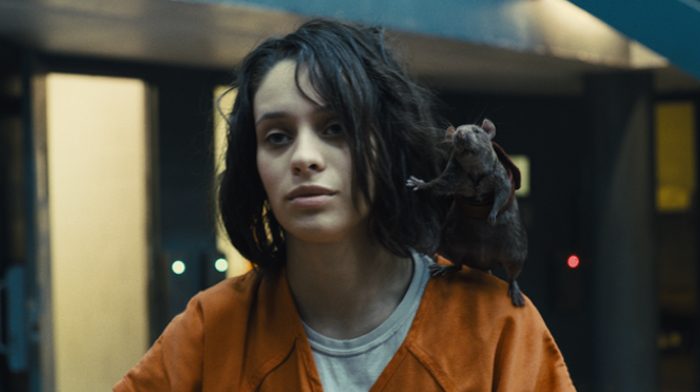
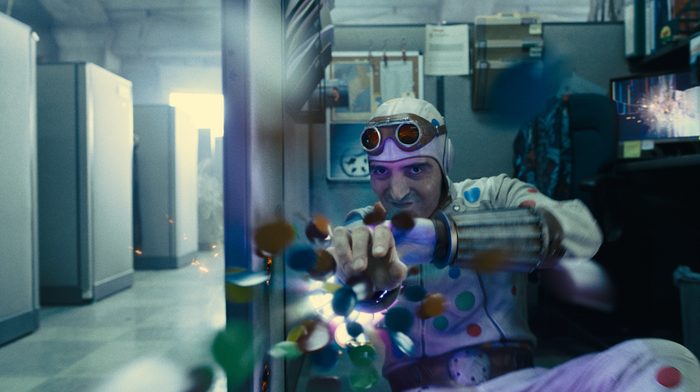
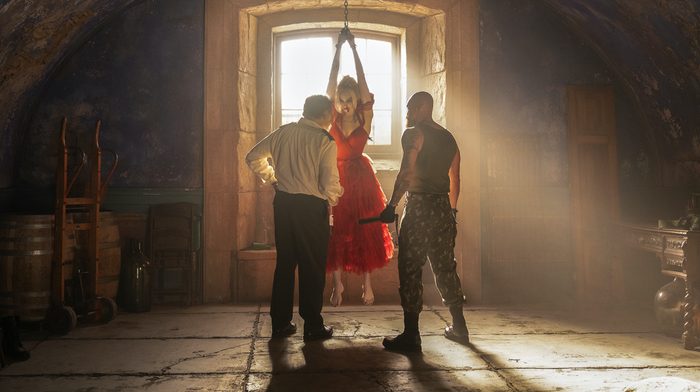
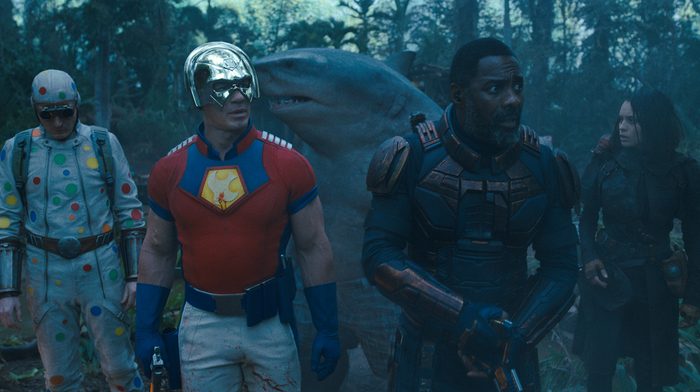
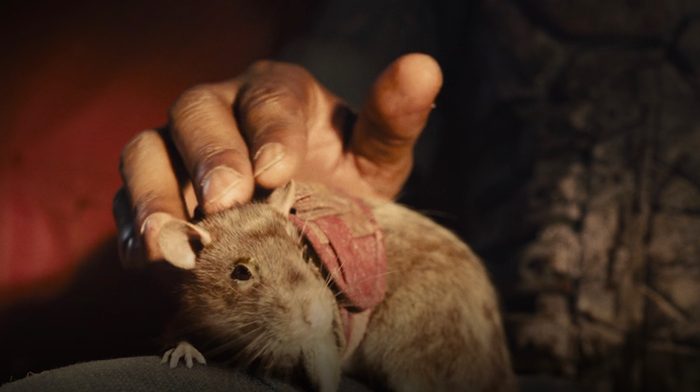
0 Comments